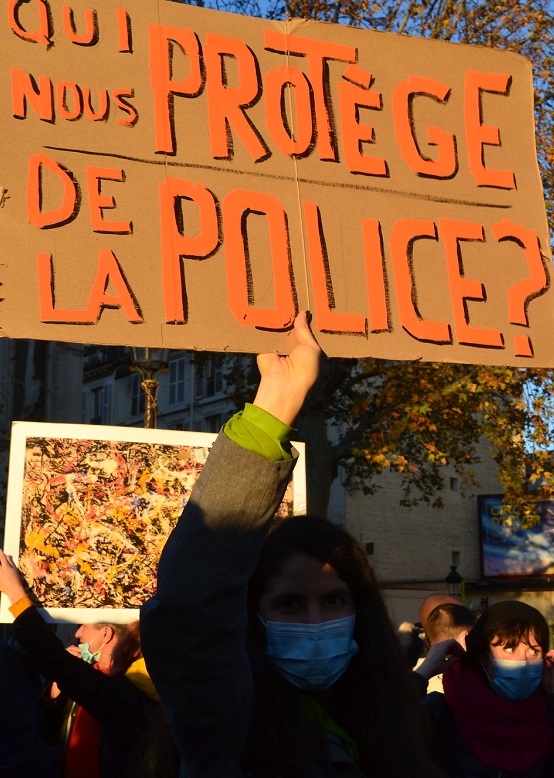Greece accused of committing crimes against humanity at its borders
Topic
Country/Region
05 February 2021
A new report by Legal Centre Lesvos accuses the Greek state of committing crimes against humanity at its borders, given the "widespread, systematic and violent" nature of the ongoing collective expulsions of people trying to reach EU territory. The report is based on testimonies from more than 50 people subjected to collective expulsions; it analyses their experiences and the practices of the Greek authorities in light of the statute of the Rome Statute of the International Criminal Court.
Support our work: become a Friend of Statewatch from as little as £1/€1 per month.

Below: full-text of the press release published by Legal Centre Lesvos on 1 February 2021 (English - Greek - French).
Full report: Crimes against humanity in the Aegean (link to pdf)
PRESS RELEASE – NEW REPORT ON CRIMES AGAINST HUMANITY IN THE AEGEAN
Since March 2020, collective expulsions in the Aegean Sea have been perpetrated with impunity.
Legal Centre Lesvos’ new report contributes to the growing body of evidence, media coverage, civil society reports and other investigations which have documented how Greek authorities are deliberately and systematically abandoning hundreds of migrants in the middle of the Aegean sea, without means to call for rescue, on unseaworthy, motorless dinghies and liferafts. It is intended to serve as a resource for survivors of collective expulsions and solidarity actors.
Following the Legal Centre Lesvos’ first report, the present report is based on evidence shared by over fifty survivors of collective expulsions, and underscores the widespread, systematic and violent nature of this attack against migrants. Beyond being egregious violations of international, European and national human rights law, this report argues that the constituent elements of the modus operandi of collective expulsions in the Aegean amount to crimes against humanity within the definition of Article 7 of the Rome Statute of the International Criminal Court.
Despite overwhelming evidence of collective expulsions in the Aegean, the national and European response has been to turn a blind eye: failing to even attempt to hold the responsible Greek authorities to account, let alone other public and private actors directly or indirectly involved. On the contrary, the European Commission has praised the violent “border and migration management” practices implemented in Greece and underwritten its support with substantial financial and material assistance. In the context of the COVID-19 pandemic which prevented Greece carrying out “official” deportations to Turkey, collective expulsions have conveniently served as an unofficial implementation of the “EU-Turkey Deal” and other bilateral “readmission” agreements with Turkey, which form part of fortress Europe’s border externalisation drive.
There are only so many times legal and civil society actors can list and table such human rights violations and be met with deafening silence and inaction before this itself becomes evidence of Greek and European liability for collective expulsions as an egregious attack on migrants’ lives. Such inaction also reveals how migrants’ lives are increasingly treated as disposable, in a manner that has historically accompanied the commission of atrocity crimes.
While the systematic violence of pushbacks in the Aegean is scandalous, it is also the logical endpoint of a dehumanising and punitive European border regime that has systematically obstructed access to territory and the right to asylum by prioritising and funding the ‘hotspot’ containment system, accelerated procedures, detention, deportations, border militarisation and externalisation through deals of questionable legality with third countries; as well as by prosecuting migrants and solidarity actors in a manner that successfully obscures Europe’s own violent, imperialist role in many of the reasons people migrate.
The absence of serious investigations, let alone practical steps to redress violations are a clear sign that collective expulsions form part of a Greek and European migration policy: instrumentalising human suffering in acts of spectacular state violence for the purpose of deterring migration, at any cost.
In this context, it is important to ask what justice might look like for survivors of crimes against humanity in the Aegean, many of whom experience ongoing psychological trauma and distress as a result of these crimes. Survivors who have been in contact with the Legal Centre Lesvos have spoken about justice in terms of being able to safely reach Europe. Justice for collective expulsions as crimes against humanity must therefore include safe and legal routes to Europe, as well as defunding, demilitarising and dismantling Europe’s violent border regime.
ΔΕΛΤΙΟ ΤΥΠΟΥ – ΕΓΚΛΗΜΑΤΑ KATA ΤΗΣ ΑΝΘΡΩΠΟΤΗΤΑΣ ΣΤΗΝ ΠΕΡΙΟΧΗ ΤΟΥ ΑΙΓΑΙΟΥ
Από τον Μάρτιο του 2020, οι ομαδικές απελάσεις στο Αιγαίο έχουν μείνει ατιμώρητες.
Η νέα αναφορά του Legal Centre Lesvos συνεισφέρει στην αύξηση των αποδεικτικών στοιχείων, στην κάλυψη από τα μέσα ενημέρωσης, στις εκθέσεις της κοινωνίας των πολιτών και σε άλλες έρευνες που έχουν τεκμηριώσει πώς οι ελληνικές αρχές εγκαταλείπουν σκόπιμα και συστηματικά εκατοντάδες μετανάστ(ρι)ες στη μέση του Αιγαίου, χωρίς τη δυνατότητα να καλέσουν για διάσωση, σε αχρηστευμένες, χωρίς κινητήρα λέμβους και σωσίβιες σχεδίες. Περαιτέρω η παρούσα έκθεση προορίζεται να χρησιμεύσει ως πηγή σχετικά με τους επιζώντες ομαδικών απελάσεων και φορέων αλληλεγγύης.
Σε συνέχεια της πρώτης αναφοράς του Legal Centre Lesvos, η παρούσα βασίζεται σε στοιχεία που παρείχαν περισσότεροι από πενήντα επιζώντες ομαδικών απελάσεων και υπογραμμίζει τον εκτεταμένο, συστηματικό και βίαιο χαρακτήρα αυτής της επίθεσης κατά των μεταναστών. Πέρα από τις σοβαρές παραβιάσεις του διεθνούς, ευρωπαϊκού και εθνικού δικαίου κατά των ανθρωπίνων δικαιωμάτων, η παρούσα αναφορά υποστηρίζει ότι τα χαρακτηριστικά του modus operandi των ομαδικών απελάσεων στο Αιγαίο ισοδυναμούν με εγκλήματα κατά της ανθρωπότητας σύμφωνα με τα όσα ορίζει το άρθρο 7 του Καταστατικού της Ρώμης του Διεθνούς Ποινικού Δικαστηρίου.
Παρά τις αδιάσειστες αποδείξεις ομαδικών απελάσεων στο Αιγαίο, η εθνική και ευρωπαϊκή κοινότητα κάνουν τα “στραβά μάτια”, αποτυγχάνοντας να φέρουν τις αρμόδιες ελληνικές αρχές προ των ευθυνών τους, πόσο μάλλον άλλους φορείς που εμπλέκονται άμεσα ή έμμεσα στις ομαδικές απελάσεις. Αντιθέτως, η Ευρωπαϊκή Επιτροπή συντάχθηκε με τις βίαιες πρακτικές «διαχείρισης συνόρων και μετανάστευσης» που εφαρμόστηκαν στην Ελλάδα και επισφράγισε την υποστήριξή της με σημαντική οικονομική και υλική βοήθεια. Στο πλαίσιο της πανδημίας COVID-19 που εμπόδισε την Ελλάδα να πραγματοποιήσει «επίσημες» απελάσεις στην Τουρκία, οι ομαδικές απελάσεις λειτούργησαν ως ανεπίσημη εφαρμογή της συμφωνίας «ΕΕ-Τουρκίας» και άλλων διμερών συμφωνιών επανεισδοχής με την Τουρκία, οι οποίες αποτελούν μέρος της προσπάθειας ελέγχου των εξωτερικών συνόρων της Ευρώπης.
Είναι τόσες πολλές οι φορές που τόσο νομικές όσο και οργανώσεις υπεράσπισης των ανθρωπίνων δικαιωμάτων έχουν απαριθμήσει και καταγράψει τέτοιου είδους παραβιάσεις. Παρόλα αυτά έχουν αντιμετωπιστεί με εκκωφαντική σιωπή και αδράνεια, τρανό παράδειγμα της ελληνικής και της ευρωπαϊκής ευθύνης για τις ομαδικές απελάσεις. Μια τέτοια αδράνεια αποκαλύπτει πώς οι ζωές των μεταναστ(τρι)ών αντιμετωπίζονται όλο και περισσότερο ως αναλώσιμες, με έναν τρόπο που προσιδιάζει ιστορικά με τη διάπραξη θηριωδών εγκλημάτων.
Παρόλο που η συστηματική βία των pushbacks στο Αιγαίο είναι σκανδαλώδης, είναι ταυτόχρονα η λογική κατάληξη ενός απάνθρωπου και τιμωρητικού ευρωπαϊκού συνοριακού καθεστώτος, που εμποδίζει συστηματικά την πρόσβαση στην επικράτεια και το δικαίωμα στο άσυλο, που προτεραιοποιεί και χρηματοδοτεί το σύστημα περιορισμού σε «hotspot», κράτησης, απελάσεων, στρατιωτικοποίησης των συνόρων και αναπομπής, μέσω συμφωνιών αμφισβητήσιμης νομιμότητας, σε τρίτες χώρες. Ταυτόχρονα το ίδιο σύστημα διώκει τους μετανάστ(ρι)ες και τις οργανώσεις αλληλεγγύης με τρόπο που θολώνει τον βίαιο και ιμπεριαλιστικό ρόλο της Ευρώπης ως προς τις αιτίες μετανάστευσης.
Η απουσία εμπεριστατωμένων ερευνών, πόσο μάλλον πρακτικών βημάτων για την απόδοση ευθυνών όσον αφορά στις παραβιάσεις, αποτελεί σαφές σημάδι ότι οι ομαδικές απελάσεις καθίστανται μέρος της ελληνικής και ευρωπαϊκής μεταναστευτικής πολιτικής και εργαλειοποιούν τον ανθρώπινο πόνο με πράξεις ωμής κρατικής βίας με σκοπό την μείωση των μεταναστευτικών ροών, με οποιοδήποτε κόστος.
Σε αυτό το πλαίσιο, είναι σημαντικό να αναρωτηθούμε πώς θα μπορούσε να αποδοθεί δικαιοσύνη για τους επιζώντες εγκλημάτων κατά της ανθρωπότητας στο Αιγαίο, πολλοί από τους οποίους βιώνουν μέχρι και σήμερα ψυχολογικό τραύμα ως αποτέλεσμα αυτών των εγκλημάτων. Οι επιζώντες που έχουν έρθει σε επαφή με το Legal Centre Lesvos μιλούν για την ανάγκη ύπαρξης ασφαλούς διόδου προς την Ευρώπη. Η απόδοση δικαιοσύνης για τις ομαδικές απελάσεις ως εγκλημάτων κατά της ανθρωπότητας πρέπει να περιλαμβάνει τη δημιουργία ασφαλών και νόμιμων οδών προς την Ευρώπη, καθώς και την αποδυνάμωση, αποστρατιωτικοποίηση και διάλυση του βίαιου συστήματος των συνόρων της Ευρώπης.
COMMUNIQUÉ DE PRESSE – NOUVEAU RAPPORT CONCERNANT DES CRIMES CONTRE L’HUMANITE DANS LA MER EGEE
Depuis le mois de mars 2020, des « pushbacks » ou expulsions collectives de migrants sont perpétrés en toute impunité en mer Égée.
Le nouveau rapport du Legal Centre Lesbos contribue à accroître le nombre de preuves déjà existant de par les articles de presse, les rapports de la société civile et les autres enquêtes ayant documenté la manière dont les autorités grecques abandonnent délibérément et systématiquement des centaines de migrants en pleine mer Égée, sans moyen de contacter les secours, sur des canots pneumatiques et radeaux de sauvetage sans moteur et hors d’état de naviguer. Ce rapport est destiné à servir de support aux survivants d’expulsions collectives et aux acteurs de la solidarité.
Le présent rapport fait suite au premier rapport du Legal Centre Lesbos et se fonde sur les preuves fournies par plus de cinquante survivants d’expulsions collectives et souligne le caractère généralisé, systématique et violent de ces attaques contre les migrants.
Au-delà de constituer une violation flagrante du droit international, européen, national et des droits de l’homme, ce rapport met en avant les éléments constitutifs du mode opératoire des expulsions collectives dans la mer Égée. Il démontre que ces expulsions constituent des crimes contre l’humanité au sens de l’article 7 du Statut de Rome de la Cour pénale internationale.
Malgré des preuves accablantes d’expulsions collectives en mer Égée, l’unique réponse aux niveaux national et européen a été de fermer les yeux, sans même tenter de demander aux autorités grecques responsables, ni aux autres acteurs publics et privés impliqués directement ou indirectement dans ces pratiques illégales, de rendre des comptes. Bien au contraire, la Commission européenne a salué les pratiques violentes de « gestion des frontières et de la migration » mises en place par la Grèce et a confirmé son soutien par une aide financière et matérielle substantielle.
Dans le contexte de la pandémie de COVID-19, la Grèce n’ayant pu expulser les migrants de manière « officielle » vers la Turquie, les expulsions collectives ont servi de mise en œuvre non officielle de l’accord entre l’Union Européenne et la Turquie, ainsi que d’autres accords bilatéraux de « réadmission » avec la Turquie, qui forment partie intégrante de la logique d’externalisation des frontières de l’Europe « forteresse ».
Les avocats et les acteurs de la société civile identifiant et dénonçant ces violations des droits de l’homme ne peuvent continuer d’être confrontées aux silence et à l’inaction assourdissants des autorités, sans que cela ne devienne une preuve supplémentaire de la responsabilité de la Grèce et de l’Union Européenne dans ces expulsions collectives portant atteinte à la vie des migrants.
Cette inaction révèle également à quel point la vie des migrants est de plus en plus considérée comme « jetable », d’une manière qui a historiquement accompagné la commission des crimes de masse.
Si la violence systématique des refoulements en mer Égée est scandaleuse, elle est aussi la conséquence logique d’une politique européenne des frontières déshumanisante et punitive qui a systématiquement entravé l’accès au territoire et au droit d’asile. Cette politique donne la priorité au système de confinement des « hotspots » qu’elle finance, mais également aux procédures accélérées, à la détention, aux expulsions, à la militarisation des frontières et à l’externalisation par des accords d’une légalité douteuse avec des pays tiers. Cette violence systématique est aussi la conséquence d’une politique qui poursuit en justice les migrants et les acteurs en solidarité, en parvenant à occulter le rôle violent et impérialiste de l’Union Européenne conduisant de nombreuses personnes à migrer.
L’absence d’enquêtes sérieuses, et de mesures pratiques pour réparer les violations commises, est un signe clair que les expulsions collectives font partie d’une politique migratoire grecque et européenne visant à instrumentaliser la souffrance humaine dû aux violence étatiques de grandes ampleurs/aux conséquences dramatiques, afin de dissuader à tout prix la migration.
Dans ce contexte, il est important de se demander à quoi pourrait ressembler la justice pour les survivants de crimes contre l’humanité dans la mer Égée, dont beaucoup souffrent encore de traumatismes psychologiques et sont en détresse à la suite de ces crimes.
Pour les survivants en contact avec le Legal Centre Lesbos la justice serait de pouvoir atteindre l’Europe en toute sécurité. Dans le cas d’expulsions collectives constituant des crimes contre l’humanité, la justice doit donc inclure un accès sûr et légal, en mettant fin au financement, à la militarisation par le démantèlement du régime frontalier de l’Union Européenne, marqué par la violence.
Press contacts / Στοιχεία επικοινωνίας υπεύθυνης τύπου / Contacts presse:
Marion Bouchetel, marion@legalcentrelesvos.org, + 30 697 761 9003 (French, Spanish, English)
Natasha Dailiani, natasha@legalcentrelesvos.org, +30 694 425 1704 (Greek, German, English)
Image: Esin Üstün, CC BY 2.0
Our work is only possible with your support.
Become a Friend of Statewatch from as little as £1/€1 per month.
Spotted an error? If you've spotted a problem with this page, just click once to let us know.

